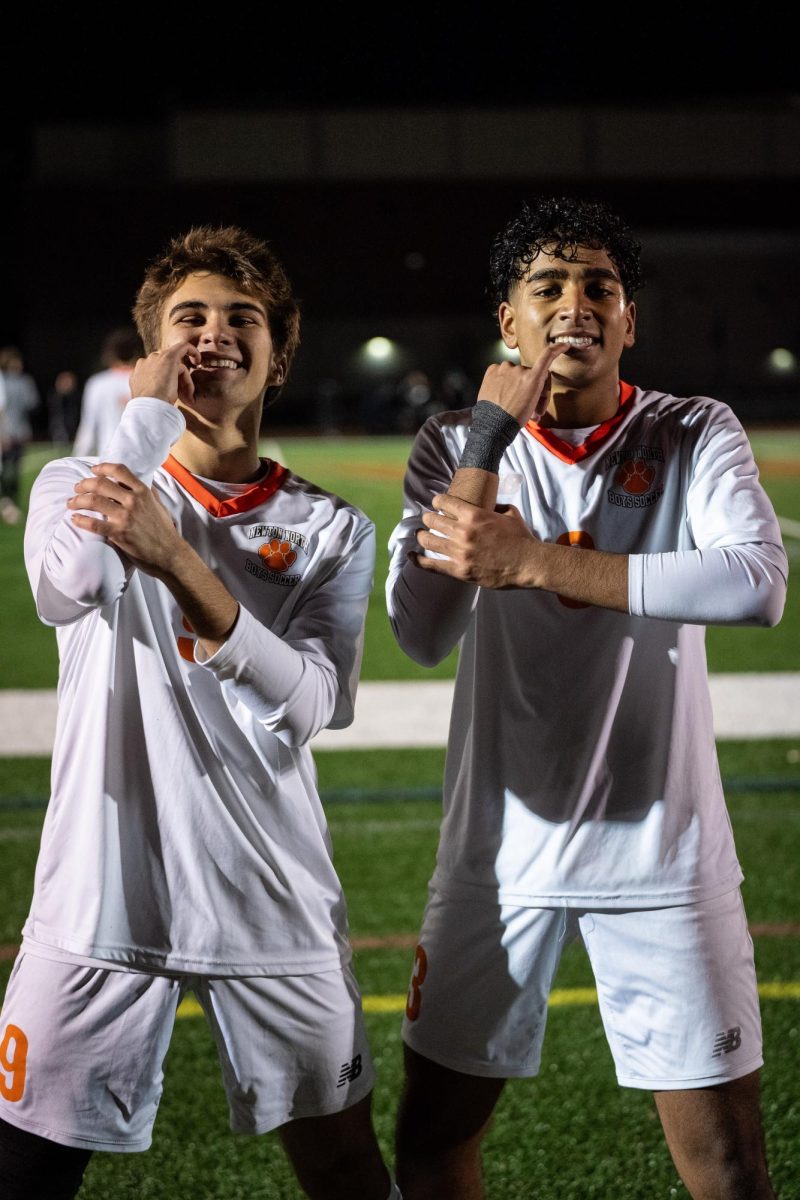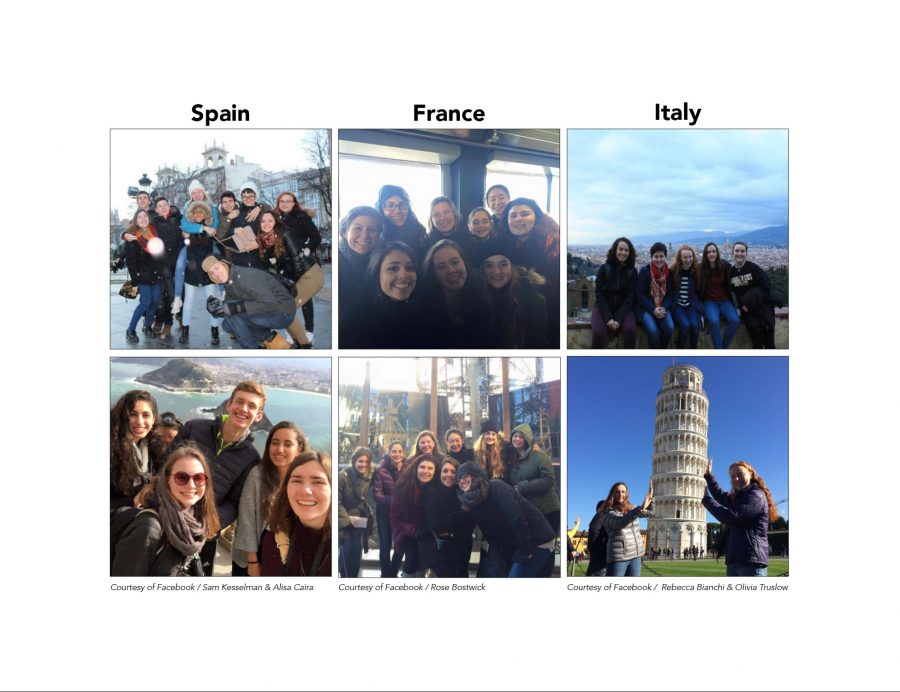by Laura Schmidt-Hong
Students at North recently visited Spain, France, and Italy for exchange trips that immersed them in different cultures and exposed them to new experiences. Between visiting tourist attractions, enjoying rich, flavorful cuisines, marveling at impressive art, and even visiting beaches, students who partook in the exchanges had the experience of a lifetime. They formed bonds with American students and their hosts alike while strengthening language skills and learning about different cultures, all sharing similar experiences on their respective trips.
Expectations
Many students were apprehensive before the trip; some worried that they would have difficulty with the language, while others feared that they would be homesick. Sophomore Einat Gavish, who took part in the French exchange, said, “I was worried that I would struggle with the French,” also noting how quickly she “went from being really excited to being really, really nervous” as the exchange approached.
Sophomore Deirdre Boyer, who traveled to Italy, shared Gavish’s concerns, commenting, “I kept going back and forth the week or two before…on whether or not I was excited or nervous.” She added that she expected to become homesick on the trip and was concerned about the large amount of schoolwork she would face when she returned.
Some students were also nervous about the everyday aspects of the exchange. Sophomore Cassie Schierer, who traveled to France, expressed these concerns, saying, “I expected that we were going to do a lot of walking…and we definitely did do a lot of walking, but the pain was worth it, as we got to visit so many beautiful places. I was also worried that my host family would not serve food that I would enjoy.”
Schierer also described her worries about socializing with others. She said, “I’m a rather introverted person, so I was worried that my shyness would keep me from having fun. It did take a little getting used to, hanging out with my correspondent and her friends, but eventually it felt normal.”
Communication
Speaking in a foreign language and being completely immersed in a different culture was the primary concern for students who took part in the exchanges. Despite students’ worries, the native speakers were understanding and even complimented the students’ language abilities. Sophomore Sam Kesselman, a member of the Spanish exchange, was worried about speaking Spanish with others, but his correspondent praised his speaking abilities. He described how he made mistakes periodically, commenting, “I would say things and sometimes her friends or other people at the school would laugh, but otherwise everything was really good.”
Gavish’s host family also complimented her language skills and were so impressed by her ability that they spoke solely in French with her. She said, “that’s one of the things that really helped me a lot, and I got to speak a lot of French, and they were really nice about it. They would help me, and they wouldn’t laugh if I made mistakes.”
Factors other than the language barrier made communication difficult. Schierer said that her host mother “is a teacher for middle school and high school students, so she is probably used to making sure children understand her, which made it easier for me to understand her because she naturally spoke slowly and clearly.” In comparison, her correspondent and her friends were difficult to comprehend due to their fast speech, poor enunciation, and use of slang, though Scheirer soon became accustomed to it.
Scheirer added that self-assurance is also important, and “outside of the family, communication wasn’t that hard. It’s pretty easy to learn the basics, and from there, all you have to do is have confidence in yourself.”
Bonding with the host family
Students also formed bonds with their host families and adapted to life with them over the duration of the trip. Kesselman described how his correspondent’s family helped him improve his Spanish. “My host mom wanted to teach me more, so she gave me a word of the day in Spanish,” said Kesselman.
Kesselman added, “on my third night in Spain, the host mom brought me to her mom’s house because it was my host student’s cousin’s birthday. The entire family was there, and we had a really big birthday celebration. I really enjoyed it, and I’m really glad they let me come to the birthday party to meet the whole family.”
Some students and their host families became emotional when they said their goodbyes. Boyer said, “when I left, my host mom even ended up crying, and overall, it was very natural to be with them. I loved my host family, and just hanging out with them was really fun.”
Sophomore Emma Ross, who took part in the Italian exchange, is also looking forward to spending more time with her correspondent. “I bonded a lot with the mom and the daughter. I’m really excited that I’ll host the daughter in September,” she said.
Connecting with other students
Along with growing close to their host families, students also connected with other students from North. Gavish expressed how she bonded with them over their shared experiences. “Being in a French school was really overwhelming…because everyone’s talking in French and everything’s moving quickly,” explained Gavish. “So in the afternoon, it would be nice to be around kids who understood your life and what it’s like to be in France on an exchange trip.” The students participated in “a lot of fun activities together,” which was especially enjoyable “because the French exchange was really small, so you got to know everybody on the trip.”
Scheirer also commented on the French exchange’s size. She worried that such a small group of students would be “really awkward,” as she only knew one of the Americans at the beginning of the exchange. However, Scheirer soon realized that they “all felt awkward together, so it was fun to share all our similar and new experiences.”
Kesselman described how he spent time with people outside his usual circle of friends because “in Spain, your entire friend group is based on your correspondent’s friend group,” so “you have to follow their schedule and their routine.” He also met and bonded with new people on the exchange, which was “really cool.”
Homesickness
Many students, despite their initial concerns, were not as homesick as they had expected. Gavish described how busy their days were, explaining, “I did not miss my family. I really thought I would, and they talked on the trip about how we would get homesick the first few days, but I really didn’t. The three weeks pass so quickly; you’re doing so much and your days are so busy that I didn’t even notice when a week passed.”
Boyer also commented that she was so busy on the exchange that she did not have time to become homesick. She added, “when I got back, we went through the entire trip, and it was nice to tell them everything that happened all at once. Even now, I’m still remembering stories, like, ‘Oh, remember when that happened in Italy?’. But I’ve been away from them for a long time before, so it wasn’t a crazy new experience.”
Scheirer expressed similar feelings, and as she has been away from her family for extended periods of time in the past, “not seeing them for three weeks was not that big of a deal.” She added, “Of course I missed them, but it wasn’t like this was the first time that I was ever away from them. I definitely missed my bed, my shower, and the food here, but being separated from my family didn’t upset me that much.”
Kesselman also said that keeping in touch with his family through technology was helpful. “I was able to FaceTime my family sometimes,” he said. “My correspondent really liked FaceTiming my parents and my siblings because she missed my family too, from when she was staying with us.”
Exploring new cuisines
Students unanimously agreed that the foreign cuisine was appetizing, and they enjoyed eating meals with their host families. Scheirer said, “the food was different, but part of the trip was learning to try new things. Although sometimes I didn’t like it, I got to try foods that I had never even thought existed.”
Schierer also described how people in French preferred American fast food to their native cuisine, commenting, “When I was there, I must have had McDonald’s for at least three of my meals, and I went to KFC for the first time ever. I only have fast food here if I’m on a road trip or pressed for time; only a couple times per year. Even if there was a much better restaurant across the street, there would always be a McDonald’s that they would prefer.”
Gavish enjoyed the cuisine as well, and her host family “would cook really nice meals every night for dinner.” She added, “I miss the food a lot. We had snails and fondue, and I felt really French, and that was pretty cool.”
Kesselman’s host family was also understanding of his dietary restrictions. He noted, “in Spain, a lot of the food is pork-based. I’m Jewish, so I couldn’t eat a lot of the things they served. A lot of the time I had to communicate with my host family about what I can and can’t eat, and they were very receptive of it. We had a lot of salad and fish.”
Missing school
Students who took part in the exchanges were apprehensive about completing missed schoolwork; many teachers at North were understanding of these concerns. According to Kesselman, teachers wished for students to enjoy their time on the exchanges: he said, “My teachers, especially Dr. Ibokette, said that it’s really important that I embrace the cultural experience, so he didn’t give me a lot of work. Many teachers decided that it’s better to enjoy the time in Spain and not get stressed out by the work.”
Boyer agreed, adding, “Teachers were really willing to work with me, and because I got most of it done over there, I wasn’t really behind in my classes. In some classes, I got back at a good time, at the end of a unit, which was really nice.”
However, not all students were able to work on assignments while on their exchanges, which was inconvenient in terms of finishing missed schoolwork. “It’s especially stressful because on our exchange, we thought we would have time in the mornings to do our own schoolwork, but we really didn’t. There was no structured time—we would get home at the end of the day and would just be wiped out and couldn’t work on anything,” said Gavish.
Ross also noted that she could not complete missed work as soon as she would have liked and said, “I think it’s three weeks later, and I’ve finally caught up. It was kind of stressful, but in the end, it was okay.”
Final thoughts
Reuniting with family when they finally returned back home was also a special moment for students. According to Scheirer, “it was kind of like a movie,” with all of the students’ families lined up in the airport awaiting their arrival. She described how touching it was to reunite with her family, adding, “When we stepped through the last hallway, they all started cheering and we ran to them. My grandma brought me flowers, as did some other families to their children, and there were tons of big hugs.”
Kesselman described it similarly, saying, “When I came home to the airport, I gave my mom a really big hug. I missed her a lot, and it was kind of touching to come back home after three weeks. It didn’t seem like three weeks, though, it felt like two days.”
On the whole, the foreign exchange trips were enlightening and enjoyable for students. Though students faced stress from missing school, they were able to bond with other students, improve their language skills, and meet new people on the exchange, making it an exceptional experience.
Categories:
Students visit Europe on exchange trips, experience different cultures
April 8, 2016
0
Donate to The Newtonite
More to Discover











































